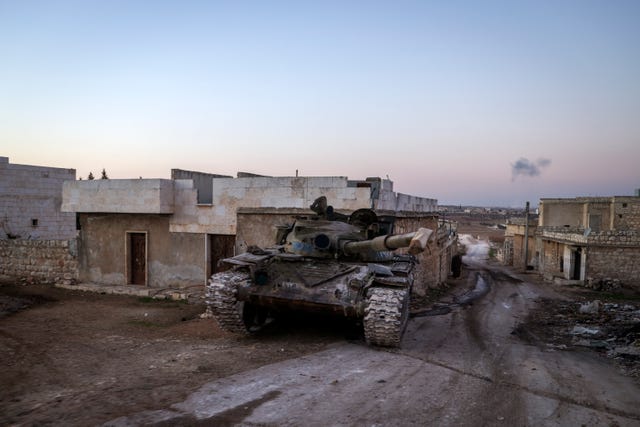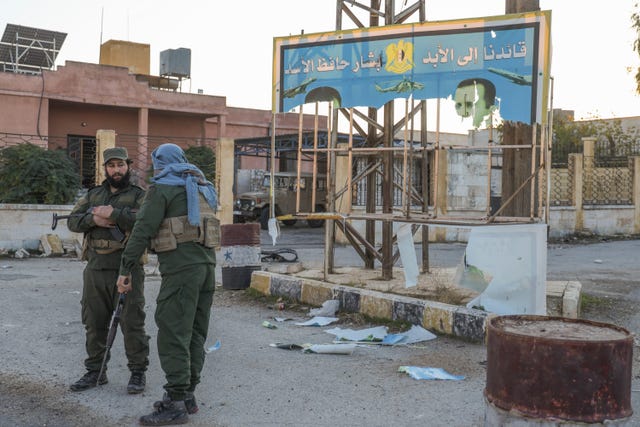
Thousands of Syrian insurgents have continued their advance on government-held areas in the country’s north-west, reaching the outskirts of Syria’s second largest city, Aleppo.
They took control of several strategic towns and villages along the way, activists and fighters said.
Syria’s state media said projectiles from insurgents landed in the student accommodation at Aleppo’s university, killing four people, including two students.
Public transportation to the city has also been diverted from the main road linking Aleppo to the capital, Damascus, to avoid clashes, state-controlled media reported.
Fighters also advanced on the town of Saraqab, in the north-western province of Idlib, a strategic area that would secure supply lines to Aleppo.

This week’s advances were one of the largest by opposition factions, led by Hayat Tahrir al-Sham, or HTS, and come after weeks of low simmering violence.
It is most intense fighting in north-western Syria since 2020, when government forces seized areas previously controlled by opposition fighters.
Syria’s armed forces said the insurgents are violating a 2019 agreement that de-escalated fighting in the area, which has been the last remaining opposition stronghold for years.
The insurgents reported that fighters have taken controlled of the Scientific Research Centre neighbourhood, on the western outskirts of Aleppo. It is the closest the rebels have come to the city since they were ousted from its eastern side in 2016.
Russia and Iran had helped Syrian government forces reclaim control of all of Aleppo that year, after a gruelling military campaign and a siege that lasted for weeks.
The battle for Aleppo was a turning point in the war between Syrian government forces and rebel fighters since the 2011 protests against Bashar Assad’s rule turned into an all-out war.
The Syrian Observatory for Human Rights said dozens of fighters from both sides have been killed in the battle that started on Wednesday.

The insurgents have seized control of more than 50 villages in their advance, which seem to have caught the government forces unprepared.
Insurgents posted videos online showing they were using drones in their advance, a new weapon they had not had previously in the earlier stages of their confrontation with government forces. It was not clear to what extent the drones were used on the battleground.
Aid groups said the fighting has displaced thousands of families, and forced some services to be suspended. The opposition fighters said their offensive will allow the return of thousands of displaced people who were forced to flee a government bombardment in recent weeks.
The offensive also came as Iran-linked groups, who had backed Syrian government forces since 2015, have been preoccupied with their own battle at home.
Israel and Hezbollah, the lead group in the Iran-backed alliance, have been locked in a war that escalated since September.
A ceasefire was announced on Wednesday, the day the Syrian opposition factions announced their offensive. Israel has also escalated its attacks against Hezbollah and Iran-linked targets in Syria during the last 70 days.
Russia, along with Iran, backed Syrian government forces soon after the anti-government protests in 2011 turned into a war.
Turkey has backed an array of opposition forces and established a military presence in parts of north-western Syria.
Meanwhile, the United States has supported Syrian Kurdish forces fighting so-called Islamic State militants largely in the east of the country.


Why are you making commenting on The National only available to subscribers?
We know there are thousands of National readers who want to debate, argue and go back and forth in the comments section of our stories. We’ve got the most informed readers in Scotland, asking each other the big questions about the future of our country.
Unfortunately, though, these important debates are being spoiled by a vocal minority of trolls who aren’t really interested in the issues, try to derail the conversations, register under fake names, and post vile abuse.
So that’s why we’ve decided to make the ability to comment only available to our paying subscribers. That way, all the trolls who post abuse on our website will have to pay if they want to join the debate – and risk a permanent ban from the account that they subscribe with.
The conversation will go back to what it should be about – people who care passionately about the issues, but disagree constructively on what we should do about them. Let’s get that debate started!
Callum Baird, Editor of The National
Comments: Our rules
We want our comments to be a lively and valuable part of our community - a place where readers can debate and engage with the most important local issues. The ability to comment on our stories is a privilege, not a right, however, and that privilege may be withdrawn if it is abused or misused.
Please report any comments that break our rules.
Read the rules hereLast Updated:
Report this comment Cancel